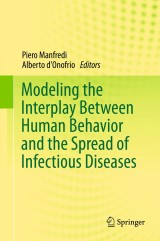Details

Modeling the Interplay Between Human Behavior and the Spread of Infectious Diseases
|
CHF 118.00 |
|
| Verlag: | Springer |
| Format: | |
| Veröffentl.: | 04.01.2013 |
| ISBN/EAN: | 9781461454748 |
| Sprache: | englisch |
| Anzahl Seiten: | 329 |
Dieses eBook enthält ein Wasserzeichen.
Beschreibungen
<p>This volume summarizes the state-of-the-art in the fast growing research area of modeling the influence of information-driven human behavior on the spread and control of infectious diseases. In particular, it features the two main and inter-related “core” topics: behavioral changes in response to global threats, for example, pandemic influenza, and the pseudo-rational opposition to vaccines. In order to make realistic predictions, modelers need to go beyond classical mathematical epidemiology to take these dynamic effects into account.</p><p>With contributions from experts in this field, the book fills a void in the literature. It goes beyond classical texts, yet preserves the rationale of many of them by sticking to the underlying biology without compromising on scientific rigor. Epidemiologists, theoretical biologists, biophysicists, applied mathematicians, and PhD students will benefit from this book. However, it is also written for Public Health professionals interested in understanding models, and to advanced undergraduate students, since it only requires a working knowledge of mathematical epidemiology.</p>
<p><b>Behavioral epidemiology of infectious diseases: an overview</b> (C. Bauch et al.). -<b>Part 1. Field data on behaviour. -</b>Survey on the likely behavioural changes of the general public in 4 European countries during the 2009/2010 pandemic (C. Rizzo et al.). -Factors influencing infant and adolescent vaccine uptake in Flanders, Belgium (H. Theeten et al). -<b>Part 2. Modeling behaviour change in response to epidemic threats. -</b>Modeling the Impact of Behavior Changes on the Spread of Pandemic Influenza (S.Y. Del Valle et al.). -Uncoordinated human responses during epidemic outbreaks (P. Poletti et al.). -The talk of the town: modelling the spread of information and changes in behavior (S. Funk and V. Jansen). -Modeling contact and mobility based social response to the spreading of infectious diseases (N. Perra and A. Vespignani). -Incorporating human behaviour in epidemic dynamics: a modelling perspective (Istvan Z. Kiss). -Risk perception, heuristics and epidemic spread (P. Liò et al.). -The mechanism and phenomena of adaptive human behavior during an epidemic and the role of information (E.P. Fenichel and X. Wang). -<b>Part 3.</b> <b>Modeling vaccinating behaviour. -</b>The Economic approach to modeling self-protective behaviour in epidemiology (F. Chen). -Mathematical epidemiology and welfare economics (M. Gersovitz). -Modeling influenza vaccination behaviour via inductive reasoning games (R. Vardavas and C.S. Marcum). -Modeling voluntary influenza vaccination using an age-structured inductive reasoning game (R. Breban). -Emergent dynamical features in behaviour-incidence models of vaccinating decisions (S. Bhattacharyya and C.T. Bauch). -Impact of vaccine behavior on the resurgence of measles (E. Shim et al.). -Vaccinating behavior and the dynamics of vaccine preventable infections (A. d'Onofrio et al.). -The geometrical approach to global stability in behavioralepidemiology (B. Buonomo et al.). - "Capturing human behaviour: is it possible to bridge the gap between data and models?" (W.J. Edmunds et al.).</p>
<p>This volume summarizes the state-of-the-art in the fast growing research area of modeling the influence of information-driven human behavior on the spread and control of infectious diseases. In particular, it features the two main and inter-related “core” topics: behavioral changes in response to global threats, for example, pandemic influenza, and the pseudo-rational opposition to vaccines. The motivation comes from the fact that people are likely to change their behavior and their propensity to vaccinate themselves and their children based on information and rumors about the spread of a disease. As a consequence there is a feedback effect that may deeply affect the dynamics of epidemics and endemics. In order to make realistic predictions, modelers need to go beyond classical mathematical epidemiology to take these dynamic effects into account.</p><p>With contributions from experts in this field, the book fills a void in the literature. It goes beyond classical texts, yet preserves the rationale of many of them by sticking to the underlying biology without compromising on scientific rigor. Epidemiologists, theoretical biologists, biophysicists, applied mathematicians, and PhD students will benefit from this book. However, it is also written for Public Health professionals interested in understanding models, and for advanced undergraduate students, since it only requires a working knowledge of mathematical epidemiology.</p>
The first book in this new and “hot” scientific topic of modeling in immunology Includes content that is primarily application-oriented Rigorous collective treatise from experts in the field
Diese Produkte könnten Sie auch interessieren:

Linear and Integer Programming vs Linear Integration and Counting

von: Jean-Bernard Lasserre

CHF 118.00

Reactive Search and Intelligent Optimization

von: Roberto Battiti, Mauro Brunato, Franco Mascia

CHF 118.00














